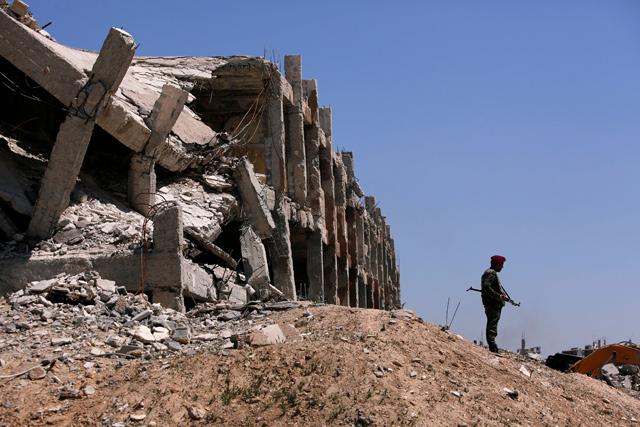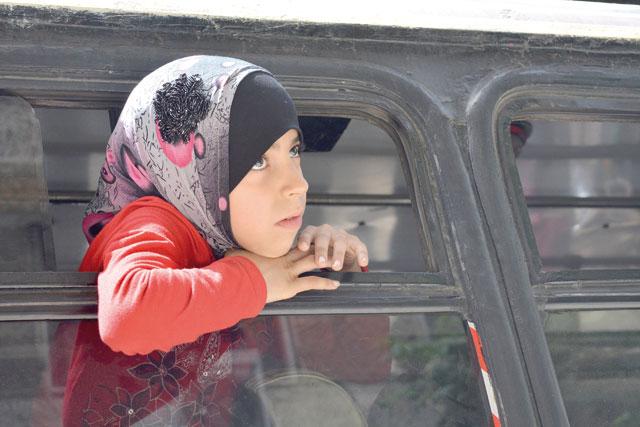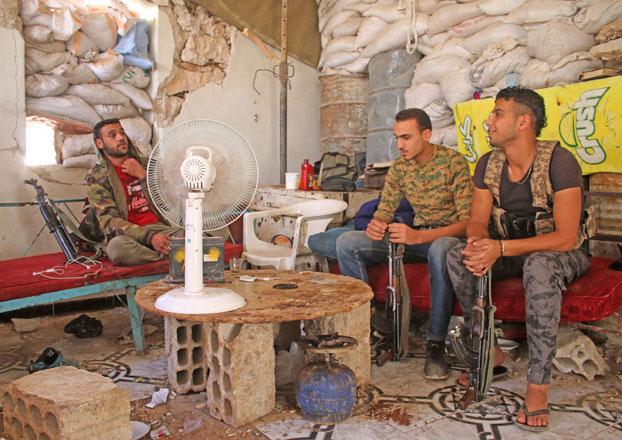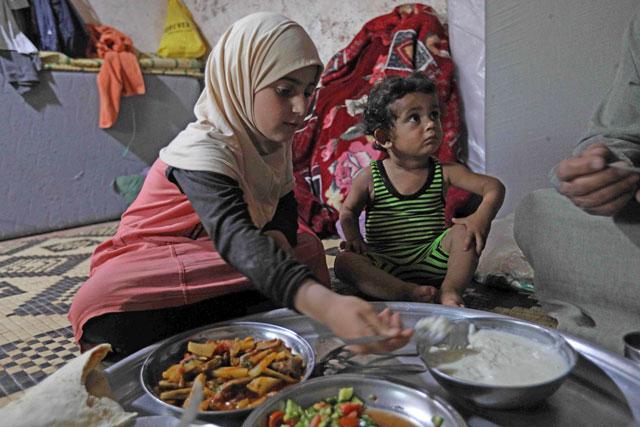You are here
In rebel Syria, a race to save precious property deeds
By AFP - Jun 22,2018 - Last updated at Jun 22,2018

A member of Syrian forces of President Bashar Assad stands guard near destroyed buildings in Jobar, Eastern Ghouta, in Damascus, Syria, on April 2 (Reuters file photo)
BEIRUT — The external hard drive had been smuggled from Syrian regime territory through extremist-held towns and into Turkey. When Ghazwan Koronful finally got his hands on it, he sighed in relief.
Loaded onto the disk were pictures of thousands of title deeds from towns in central Syria recently recaptured by government troops and largely emptied of their residents.
Fearing Syria's regime would expropriate abandoned properties or tamper with deeds, a network of activists and lawyers set their covert plan into motion.
"It was our most complex operation yet," said Koronful, a 65-year-old Syrian lawyer who heads the network from Turkey, where he has lived in exile since 2012.
For nearly five years, Koronful's Free Syrian Lawyers (FSL) have been working to preserve property deeds and other civil paperwork in Syria's opposition areas.
They enter town registries, photograph the documents, carefully log and organise them, then smuggle the hard drives across Syria's sealed northern border into Turkey.
"In total, we've got eight terabytes of documents, about 1.7 million documents — court records, wills, birth, marriage, and death certificates," said Koronful.
Among them are up to 450,000 land-related documents from northern and central Syria — title deeds, contracts, and other papers that displaced Syrians could use to prove property ownership.
These documents are crucial now, Koronful explained, as the government passes a series of laws that rights defenders fear may unfairly dispossess Syrians from their homes.
"Our work simultaneously protects against hostilities that could damage the deeds and against the regime's attempts through these new laws to tamper with people's properties," he told AFP.
"Those files represent the hope of return."
Race against air strikes
FSL sprang into action after Homs city's registry was destroyed in a fire in 2013, which activists suspected was a regime bid to strip oppositionists of their land.
Smuggling out original deeds from other towns was risky and could be considered tampering, so the FSL's 15 lawyers opted for the next best thing: digital copies.
With help from civil society group The Day After, they travelled to Turkey to learn how to handle, photograph and archive documents.
Back in Syria, they began working through abandoned registries in northern rebel towns: Harem, Azaz, Saraqeb.
"We set up a little studio in the room with the most light," said an FSL lawyer still in Syria who identified himself as Samer.
With just four Canon digital cameras, two laptops, flashes, and tripods, they photographed thousands of deeds, making sure names and dates were clearly visible.
"As soon as we'd finish one 200-page ledger, we'd upload the SD card onto the computer. Meanwhile, the camera didn't stop. We'd put a new card in and start photographing again," Samer, 43, told AFP.
Each month, they emptied their computers onto external drives which they sent to Koronful in Turkey.
They raced against air strikes that damaged cameras and wounded staff members, worrying registries would be bombed to pieces before they could finish.
"When we reached the last page, we'd be so happy to be finished. Whatever happens now, if we get bombed, we have a drive with everything on it," said Samer.
Sometimes they lost the race. In 2013, days before FSL was to begin photographing deeds in the northern town of Al Bab, the Daesh group swept in and destroyed the registry, Koronful said.
They now struggle to get permission to enter registries from suspicious rebels, especially in extremist-run Idlib, occasionally photographing in secret.
Since Syria's war erupted in 2011, more than 6 million people have been internally displaced and another 5 million have fled the country.
More than 920,000 have been displaced this year alone, the UN said, the fastest rate yet in the seven-year war.
A vast majority leave behind property-related papers, the Norwegian Refugee Council found in polls last year.
That puts them at risk of losing access to their land through decrees like Law 10, which allows for property expropriation for urban development.
Koronful fears the regime could also dispossess refugees through legislation on re-issuing damaged deeds.
Related Articles
BEIRUT, Lebanon — Rights groups and specialists are sounding the alarm over a new Syrian law on urban development, saying millions of displa
DARAA, Syria — "Your turn, Doctor." Seven years after scribbling the anti-Assad slogan that sparked Syria's war, activists-turned-rebels Moa
MAARET MASRIN, Syria — After years of Syrian government siege, Umm Samer can finally prepare an appetising spread to end her family's daily




















